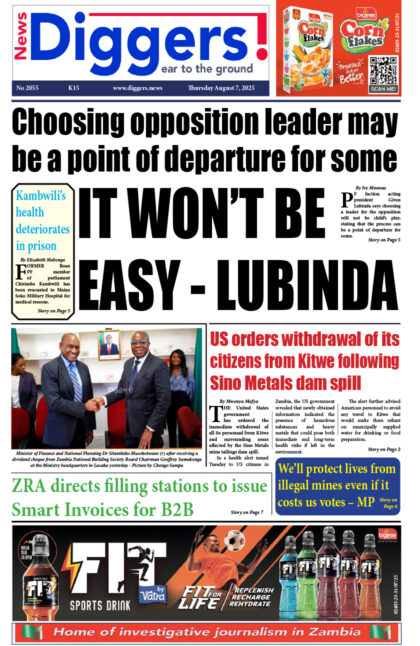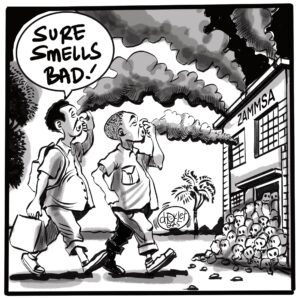GOVERNMENT says the World Bank has committed a total of $564 million concessional financing to Zambia, part of which will come now and the rest on condition that the country gets the IMF programme.
And Finance and National Planning Minister Dr Situmbeko Musokotwane says there is no plan B because plan A, which is the IMF programme, is going to materialise.
Meanwhile, Dr Musokotwane has revealed that works on the Lusaka-Ndola dual carriageway may commence in the next four to five weeks.
During a media briefing, Friday, Dr Musokotwane insisted that the kind of borrowing that was taking place now was in conformity with debt sustainability.
“The World Bank did commit to provide more financial resources ($564m) to Zambia. And I repeat, on many occasions colleagues have been asking ‘if you say the country is heavily indebted, why are you again borrowing from the World Bank’. And the answer just to repeat is that the kind of borrowing that is taking place now is in conformity with debt sustainability. But more importantly, as we do these reforms, as Zambia struggles to get out of the debt crisis you need financing. You need financing because as we cut the cloth, cut the jacket to the cloth that is available, we want to make sure that in so doing, we don’t put excessive pressure on core social sector areas in particular,” he said.
“We need to hire teachers, we need to build classrooms, we need to build health facilities, hire medical staff. And of course, these are all things that are highly required. But then you want to do these things at a time when you have no money. You are indebted so there will be a lot of pressure on the poor of the poorest. To avoid that, as we restructure everything else about the economy, it is necessary to get the concessional financing. Concessional means it’s cheap and it’s convenient. World Bank money the interest rate is roughly about 0.5 percent and is paid over a long period of time.“
He said part of the support from the World Bank was expected now while the other part would come upon Zambia getting into the programme with IMF.
“So the World [Bank] is providing support and part of that support will come now. But part of it is conditional upon Zambia getting into the programme with the International Monetary Fund, hence that why it is very important that we get this formal programme with the IMF so that it can unlock money from the World Bank. And of course, also reduce further concessional funding from the IMF itself,” Dr Musokotwane said.
He expressed confidence that in the next five to 10 years, the country’s economy would have grown and Zambia would have no challenges paying back the loans.
And Dr Musokotwane said there was no plan B because plan A, which was the IMF programme, was going to materialise.
“Regarding the programme of Zambia with the IMF transiting from the staff level agreement that was signed last year, we expect that this should be on course and happen before the end of June this year. There is no plan B about this. We must understand that very well. There is no plan B because what we are doing is the only sensible thing to get this economy out of problems. This is a plan that Zambia has used before to get out of debt crisis… So there is no plan B because this plan A is going to work,” Dr Musokotwane said.
He said if the UPND did nothing about Zambia’s debt, the temptation of printing money which led to increased inflation rate in the past would have continued.
“Supposing we did not take all these efforts to engage the IMF, to engage the creditors so that our debt is brought within manageable levels, and this is a very important question that we should always be asking ourselves because some people are saying ‘why do you bother about the IMF, why would you bother about creditors’. But the counterfactual question is very important: if we did nothing, what would happen to this country? And here is the answer, if we did nothing, all those problems that we used to see would have continued with us, the problem of an underfunded budget which fails to hire teachers who are needed, which fails to hire medical staff who are needed,” Dr Musokotwane said.
“An underfunded budget that allows so many of the children of the nation to stay away from school because there is no money to support them. It would have also meant that the temptation to print money as it was happening before would have been strong. All that inflation that you saw building up was because of printed money. There are technical issues to that which I don’t want to go into detail. But the simple and factual thing about it is money was being printed. So inflation was rising. If we did nothing, that kind of problem will be continuing today. If we did nothing, the exchange rate that we used to see acting like a yoyo, today [it] is 10, tomorrow 12, the other day 15, the other day 17, the other day 20, if we didn’t follow this path the exchange rate would have continued to be wild.”
Meanwhile, Dr Musokotwane said works on the Lusaka-Ndola dual carriageway could commence in the next four to five weeks.
“I think many of you are aware that the Lusaka-Ndola road is in very bad shape. There was a previous attempt to borrow large sums of money to do it. This government could not do so. But again in the next four to five weeks we can conclude a deal with the private sector to do that road as a dual carriage route from Lusaka to the Copperbelt. Not using government money, using private sector money. The process is in a very advanced stage and we feel that this stage in the next four to five weeks we should be able to put a contractor and say do this road,” he said.
And at the same event, Secretary to Treasury Felix Nkulukusa shed more light on the upcoming Zambia, World Bank concessional loan.
“Under the World Bank, there is what is called the IDA (International Development Assistance). This is highly concessional financing that the World Bank gives to the low-income countries and Zambia is one of the low-income countries and therefore benefits from the IDA loans. The IDA loans have got interest rates of about 0.57 percent, under 1 percent. They have got a grace period of about 10 years. And they have got a repayment period of up to 30 years. And under the IDA 19 which is coming to an end on 30th June 2022, we have now mobilised and we will be able to get the resources of about $564 million,” he said.
“This was the allocation under IDA 19, it’s about 600. 100 of it was already committed and the 500 was not committed because of the challenges we had on the debt situation. Now that there is light at the end of the tunnel, the World Bank has come back and said ‘if everything is in accordance we will be able to give you’.”
Nkulukusa said $275 million from the Word Bank concessional loan was tied to the IMF programme.
“How much of this is linked to the IMF programme? It is what is called the development policy operation or basically budget support. For them to be able to give us the budget support, to be able to give us the money to use it the way we want it means that there must be a programme that shows that we are indeed undertaking the micro economics that we agreed in the budget. And that the independent referee is the IMF. And this is why this amount is tied to the IMF programme. This amount that is tied to the IMF programme under the IDA 19 which is closing in June 2022 is about $275 million. When we get the programme, the World Bank will come on the table with $275 million as budget support,” said Nkulukusa.
“We expect under IDA 20 replenishment to get additional financing that starts from July 2022 and it goes for three years. We are expecting the minimum we can get is again $564 million which was the level of IDA 19. But probably we can get even more than that.”























